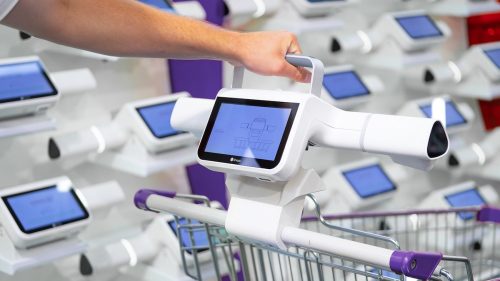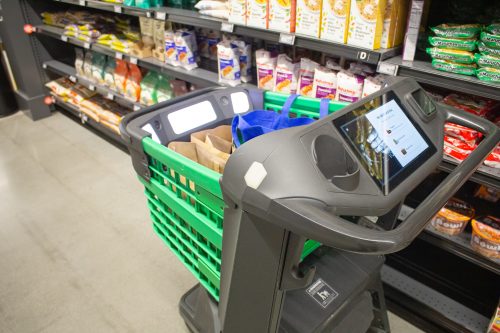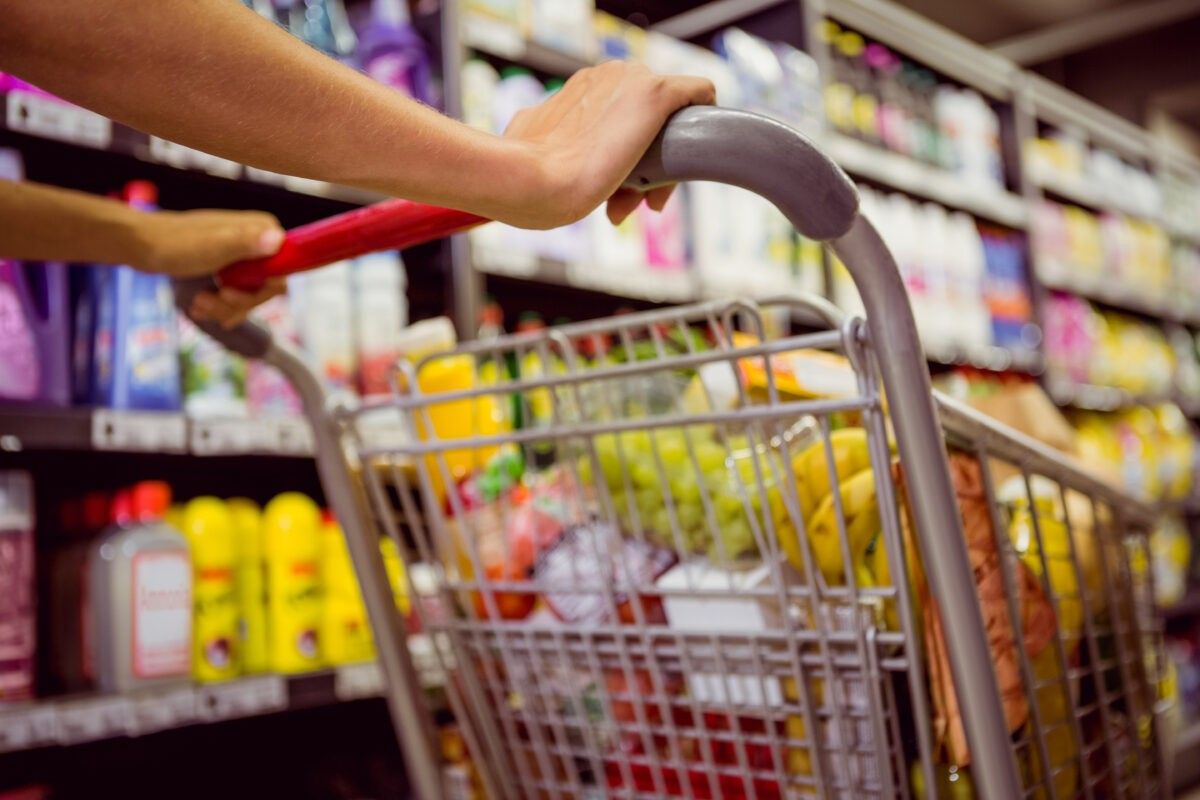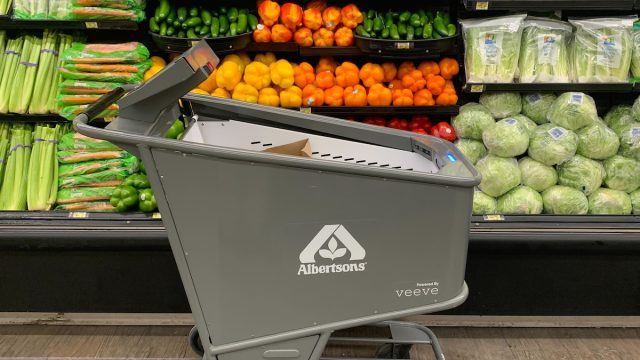4 Ways AI-Powered Carts Are About to Change How You Grocery Shop
New retail technology adds up what's in your cart with no waiting in line.
If you've ever dreaded the self-checkout at your grocery store—but found it to be a better alternative than waiting in a long, tedious checkout line—new retail technology could make the shopping experience faster and easier, and it might even save you money. AI-driven "smart cart" devices that attach to customers' shopping carts and scan items as they're placed in the cart are the latest entry in retail stores' race to automate the shopping experience (and collect valuable consumer data).
Such smart shopping carts are now being tested in U.S. grocery stores like Kroger and Wegmans. To learn more about how this new technology might shake things up, we spoke to retail experts. Read on to hear how smart carts could transform the way you shop.
READ THIS NEXT: 5 Red Flags About Shopping on Temu, According to Retail Experts.
How Smart Shopping Carts Could Change How You Shop
How the carts work.

According to a recent Forbes report, Tel-Aviv-based company Shopic announced it will be rolling out its smart cart devices in Israel's largest grocery chain, as well as two Wegmans grocery stores in Amherst and Rochester, New York
Customers take the Shopic device from a rack and clip it to an ordinary shopping cart; the device uses algorithms to identify items as they're put into or taken out of the cart with 99.4 percent accuracy, according to Shopic CEO and co-founder Raz Golan.
But Shopic is far from the only player in the game. Grocery delivery company Instacart's Caper AI devices are being tested in Kroger, Sobey's, and Wakefern; and Albertsons is working with Seattle-based Veeve on a test in two stores in California and Idaho, according to Retail Wire.
Amazon's Dash Carts, shopping carts equipped with sensors that debuted in 2020, are similarly in use in the company's Amazon Fresh supermarkets. According to Supermarket News, Amazon's carts were more recently updated to be weather-proof and will start rolling out at Whole Foods Markets.
Golan is firmly convinced that this technology will improve the in-store shopping experience for customers in the way that e-commerce has done for remote shopping. "Essentially, what we're trying to do here at Shopic is to bridge the gap between e-commerce and in-person shopping experiences," he tells Best Life. "Given the extent to which people have gotten used to the conveniences of e-commerce, there are certain aspects of that experience that are only possible in a digital-first environment."
With that in mind, here are four of the biggest ways smart carts could change how you shop.
READ THIS NEXT: Walgreens Store Bans Purses and Bags to Prevent Shoplifting—Will Others Follow?
1. They'll make shopping trips faster.

Smart carts let shoppers keep track of their purchases as they put items in the cart and enjoy the convenience of self-service payment and checkout right from the cart when finished. The carts can quickly locate items that shoppers are looking for without having to traverse store aisles in a seemingly futile search. If needed, they can quickly help find customer service assistance.
Julie Ramhold, consumer analyst with DealNews.com, points out that currently "part of the in-store shopping experience is obviously having to collect your items and then stand in line to checkout." These AI-powered carts take that out of the equation. "Because of that, this has the potential to cut down on your shopping time overall, since you can just grab what you need, pay via the cart, and you're done," Ramhold adds.
2. They can make shopping more efficient and save you money.

Smart cart tech can inform shoppers of specific items on sale, link to loyalty programs, and point out promotions. The personalized experience, of course, provides customer data, adding value for grocery retailers. The data in turn helps to optimize inventory and store layouts and points out changes in shopper preferences.
"Once you integrate the inventory management system with shopping carts, customers can get price updates in real-time," explains Marcus Arcabascio, retail expert at Menu Price. "This pertains to pricing information for items they've placed in their carts."
Ramhold points out that this is especially helpful if you're on a budget. "Then you may spend part of your time tallying up items you've already picked up to determine whether or not you're still on budget. This can lead to having to make adjustments to purchases if you go over your limit and putting things back at the end before you go to checkout. However, by using smart shopping carts… you can easily see a running tally of what your trip is costing you."
For more retail advice delivered straight to your inbox, sign up for our daily newsletter.
3. But they might lead to overspending.

Ramhold sees the flip side to so much efficiency: It might be too easy to add items to your cart and your overall order if you're not paying close attention to how much you're purchasing. And you may not want to bother putting something back on the shelf just to save a few bucks. Over time this habit can add up.
Pam Danziger, market researcher and founder of Unity Marketing, cautions that all of this convenience, while benefitting retailers by allowing them to collect customers' data, could backfire "when customers discover how high the running total for all the stuff in their carts goes after only traversing a couple of aisles in the store, leading them to backtrack to reshelve or swap out another choice."
4. They could mean more security checks.

While the technology might make things highly convenient for shoppers, it could also lead to inventory loss from stores.
"Some shoppers will purposely try to get away with not scanning an item, for example, or they may simply forget," cautions Ramhold. "The good thing about smart shopping carts is that they use the tech to actually see when something has been added or removed from a cart, which is a great solution in theory. But if the tech malfunctions or isn't as precise for some reason, then it may make it easier for consumers to shoplift, which can hurt a store's bottom line."






















